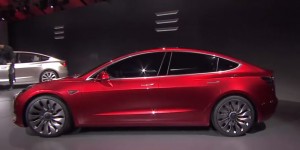The federal tax bill back in December spared the generous $7500 EV tax credit that a purchaser of an electric vehicle now receives. But not all the automakers are jumping for joy about it, particularly GM and Tesla. As the New York Times explained:
That’s because as now structured, the tax credit puts Tesla and G.M. at a competitive disadvantage, especially compared with foreign rivals who are just starting to ramp up electric vehicle sales in the United States. The tax credit begins to phase out after a company sells 200,000 electric vehicles — a threshold both Tesla and G.M. are expected to reach this year.
Meanwhile, buyers of electric BMWs, Volkswagens and Volvos will continue to get the full $7,500 credit. All of those manufacturers have announced aggressive sales plans for electric vehicles in the United States but so far have sold relatively few of them.
It now seems clear that limiting the taxes to 200,000 vehicles per automaker, as opposed to an industry-wide credit or one that expires for all companies by a date certain, will penalize EV pioneers like Nissan, GM and Tesla going forward. Their vehicles will soon be more expensive than competitors’ who waited to introduce their EVs until now and will therefore have customers who can take advantage of the tax credit for their company.
 It’s already affecting customers who want to buy Tesla’s “mass market” Model 3. Many of them were hoping to get the cheaper version of the vehicle before the tax credit expires for the company, but Tesla is first introducing the more expensive version of the car with longer range. Customers who want the cheaper model will probably be out of luck by then, tax credit-wise.
It’s already affecting customers who want to buy Tesla’s “mass market” Model 3. Many of them were hoping to get the cheaper version of the vehicle before the tax credit expires for the company, but Tesla is first introducing the more expensive version of the car with longer range. Customers who want the cheaper model will probably be out of luck by then, tax credit-wise.
With Republicans in charge of congress, it’s unlikely they’ll change the current EV tax credit structure. But ideally it would be reformed to affect all companies equally, while phasing out over time to reflect the decreasing costs of producing the vehicles.
Steve LeVine over at Quartz has an excellent write-up of the Tesla versus General Motors showdown to build the first mass market, long-range EV:
The stakes are enormous. Most electrics have less than 100 miles of range. Experts regard 200 miles as a tipping point, enough to cure many potential electric-car buyers of “range anxiety,” the fear of being stranded when their battery expires. If GM and Tesla crack this, sales of individual electrics could jump from 2,000 or 3,000 vehicles a month to 15 to 20 times that rate, shaking up industries from cars to oil, which were until now certain that large-scale acceptance of electrics was perhaps decades away.
LeVine traces the economic and engineering challenges to bring battery costs down so dramatically. Musk is betting on economies of scale through mass production. But the scientific consensus is dubious. Experts point to the difficulty of building a better anode (the negative electrode):
All current lithium-ion batteries use graphite anodes. But scientists say a big jump in performance would be possible if they could perfect a silicon anode, which would absorb far more lithium than graphite, increasing how much energy could be stored. The problem is that in tests thus far, silicon expands, cracks and kills the battery. The US government is funding six efforts to create a working silicon anode that can go commercial, but even if one or more are successful, they would not deliver a 200-mile car by 2017 or 2018.
Meanwhile, Nissan is quietly improving the LEAF’s battery range. By 2020, given the current decreases in battery costs, Nissan may be able to offer a 170-mile model for the current price (approximately $29,000).
It’s very encouraging to see so much capital and ingenuity devoted to cracking this battery code. Let’s hope for success and that it happens quickly.


